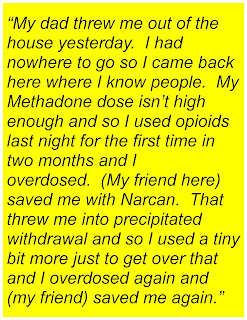Michael has been living on the streets of Kensington for several years. He “boosts’ (shoplifts) to raise some of the funds that he needs for his drug addiction. He’s actually far more reliant on his street girlfriend’s doing of dates to support his habit as she funds her own addiction.
About three months ago, Michael was caught shoplifting and taken to the local jail. It was also discovered that he had outstanding warrants for missing his probation appointments.
As part of the intake process, he listed his home address as ‘homeless.’
Over the next three months, as he unintentionally detoxed and had time away from his drug use, a seed of rational thinking took root. By the time he was discharged from jail, he had decided that he was done with drug use. He had gained much of his physical health and was beaming with a new sense of life, the likes of which he’d not known in years.
It was on a Sunday that I saw Michael for the first time in those three months. He explained how very done he was with his past lifestyle.
He added a powerful exclamation point to his statements:
“Jail was actually a blessing in disguise!”
I asked him why he was there, on the street, when he said that he was done with it all.
“I was discharged from jail on Friday night. I hope to meet with the housing folks on Monday to get into a shelter or start looking for an apartment.”
In the meantime, for those approximate 72 hours, at least to some degree, he’s reliant on boosting and his girlfriend’s dates just to supply his basic food needs.
I saw him again this past Wednesday. He was still living on the street, boosting a bit and relying on her as his primary source of income. I asked how he was doing with staying away from his drug use…
“I’m dabbling a bit with it.”
**********
Michaela has been living on the streets of Kensington for several years. She does dates to raise most of the funds that she needs for her drug addiction and for a large part of her street boyfriend’s addiction.
About three months ago, Michaela was caught in a prostitution ‘sting operation’ and taken to the local jail. It was also discovered that she had outstanding warrants for missing her probation appointments.
As part of the intake process, she listed her home address as ‘homeless.’
Over the next three months, as she unintentionally detoxed and had time away from her drug use, a seed of rational thinking took root. By the time she was discharged from jail, she had decided that she was done with drug use. She had gained much of her physical health and was beaming with a new sense of life, the likes of which she’d not known in years.
It was on a Sunday that I saw Michaela for the first time in those three months. She explained how very done she was with her past lifestyle.
She added a powerful exclamation point to her statements:
“Jail was actually a blessing in disguise!”
I asked her why she was there, on the street, when she said that she was done with it all.
“I was discharged from jail on Friday night. I hope to meet with the housing folks on Monday to get into a shelter or start looking for an apartment.”
In the meantime, for those approximate 72 hours, at least to some degree, she’s reliant on doing dates just to supply her basic food needs and very possibly for the drug needs of her street boyfriend.
I saw Michaela again this past Wednesday. She was still living on the street and doing dates for basic income. I asked how she was doing with staying away from her drug use…
“I’m dabbling a bit with it.”
**********
Michael and Michaela both experienced the growth of a seed of rational thinking that could have grown into a strong plant and led them to a new life.
During those three months of incarceration, nothing had been done in regard to housing in preparation for their discharge.
And so the cycle of recidivism comes back to square one. In fact, having been opioid-free for those 12 weeks, both are at higher risk of overdose and death since their bodies have reset to having no tolerance to these substances.
**********
In a very real way, those 12 weeks of jail time were equivalent to 12 weeks of hospital admission time. Each patient entered fully addicted and left non-addicted.
It’s not at all unusual for a hospitalized patient to be transferred to an extended care facility prior to going home. This transfer process to an extended care facility is prepared for even as the person is in their active healing mode.
For both Michael and Michaela, it was a known fact that their home was in a state of homelessness. How much better off would they be if their equivalent of extended care - shelter or subsidized housing or better yet, rehab - had been worked out prior to their discharge from jail?
While none of this can produce guaranteed results:
There would have been no more boosting and dating.
There would have been no more chance of overdosing.
There would have been the potential for eventual reunification with family and re-establishment of a healthy life.
There would have been the re-entering of two people into the workforce, contributing to society, paying taxes and so much more.
An overlooked aspect of harm reduction is to pre-arrange the transfer of homeless former inmates to an awaiting rehab, shelter, or subsidized housing.


